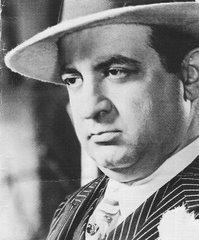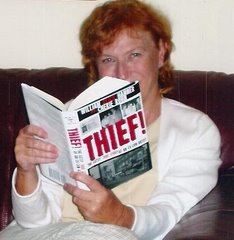
 The New Criminologist recently posted the following story on its informative website. Mob Speak kindly thanks publisher Steve Morris for permission to reprint the article in its entirety.
The New Criminologist recently posted the following story on its informative website. Mob Speak kindly thanks publisher Steve Morris for permission to reprint the article in its entirety. 1/13/2009
Can Mafia museum be a U.S. stimulus project?
Steven Freiss
LAS VEGAS: After taking a hail of bipartisan bullets in recent days over the suggestion that a federal stimulus package should help pay for a proposed $50 million museum here on the history of organized crime, the project's godfathers are returning fire, complaining that politicians in Washington are scapegoating the museum and the city.
The planned Las Vegas Museum of Organized Crime and Law Enforcement, aka "the Mob Museum" on its own Web site, is to include interactive exhibits where visitors can snap their mug shots, stand in police lineups and wiretap one another. Such a center, Mayor Oscar Goodman said in an interview Thursday, is "absolutely falling within the four corners of what President-elect Obama is trying to achieve."
"This is a project where all the plans are in place and we can start it within 30 days," said Goodman, a former criminal defense lawyer who represented several Mafia figures in the 1970s and 1980s.
Citing studies showing that 250,000 tourists a year would visit the attraction and noting that tourism is to Las Vegas what car sales are (or were) to Detroit, the mayor continued: "I don't know why Mitch McConnell would take on this project. It's a great project."
Mayor of Las Vegas, Oscar Goodman, cites Obama in pro-museum launch. (photo above left)
Senator Mitch McConnell, Republican of Kentucky, the minority leader, attacked the museum this week as a kind of localized earmark project that does not belong in legislation Congress passes to jump-start the flailing economy.
Jon Summers, a spokesman for Senator Harry Reid, a Nevada Democrat and the majority leader, said McConnell's statements were "moot because Senator Reid has been clear that there will be no earmarks" in the American Recovery and Reinvestment Plan, as President-elect Barack Obama calls the program. The money, Summers said, is likely to go to federal agencies for disbursement based on criteria not yet decided.
Due to open in 2010, the museum would occupy the entire 42,000 square feet, or 3,900 square meters, of a three-story neoclassical building that was the first federal courthouse in Clark County and one of the sites of the 1950 hearings into organized crime led by Senator Estes Kefauver, Democrat of Tennessee.
The creative director of the planned museum, Dennis Barrie, who also curated the International Spy Museum in Washington and the Rock and Roll Hall of Fame and Museum in Cleveland, said the structure was the second-oldest in Las Vegas and needed a $26 million restoration, which has begun. So far, $15 million has been raised, including about $3.6 million in federal grants and a nearly equal amount in state and local money, since 2001. A full-throttle fund-raising effort is to begin this year.
The federal government deeded the building to the city for $1 in 2000 and required that it be put to a cultural use.
"I'm sure it's good fodder for politicians," Barrie said, "but the interesting thing about the mob museum is that it's a real look at the history of organized crime in America that goes back to the late 19th and early 20th centuries when the mob came out of the various ghettos and how it influenced America. A lot of people, what they know about the topic is what they learned from Hollywood."
That said, Tony Soprano and Michael Corleone would get their due in a room about the Mafia's influence on popular culture, and visitors would be exposed to unvarnished tales of the exploits of law-enforcement and mob figures, said Ellen Knowlton, a retired special agent in charge for the Federal Bureau of Investigation who is the museum's chairwoman.
"We're trying to make sure this project is as accurate as possible," she said, "so there are people involved who have had organized crime in their life or family. I don't want to go beyond that to say who is participating. But it's interesting that a number of people want their family's side of the story told accurately."
Iconic fictional mob figures such as Tony Soprano will also find space among their real-life organized crime counterparts. (photo avove right)
Even within Las Vegas, though, the project is controversial. The mayor acknowledged that some Italian-Americans were so alarmed when he first broached the idea in 2002 that he backed off quickly.
The FBI supports the museum and has agreed to lend records and other artifacts to be exhibited. But among those opposed is a former federal prosecutor, Donald Campbell, who had a hand in breaking the mob's hold on Las Vegas in the 1980s.
"I don't think we should ever romanticize a criminal activity," Campbell said.
A spokesman for McConnell, Don Stewart, said the senator was not attacking the idea of the museum so much as Goodman's inclusion of it on the list of projects he would jump-start with stimulus money.
"The parameters for this bill need to be: Does it create jobs? Is it a waste of the taxpayers' dollars? Is it something that will help us long-term, not just a temporary thing?" Stewart said.
Supporters say the museum will do just what the bill intends.
"This project exactly meets the criteria," said Alan Feldman, a museum board member and senior vice president of the casino giant MGM Mirage, the state's largest private employer. "It is a construction project. It's a legacy project; it's a project that stimulates the economy by putting a wonderful tourist attraction downtown."
Either way, Goodman, the mayor, is clearly enjoying the national attention that the museum financing plan has prompted.
"This is $1 million worth of publicity for us," he said. "I love it. Just spell my name right."



No comments:
Post a Comment